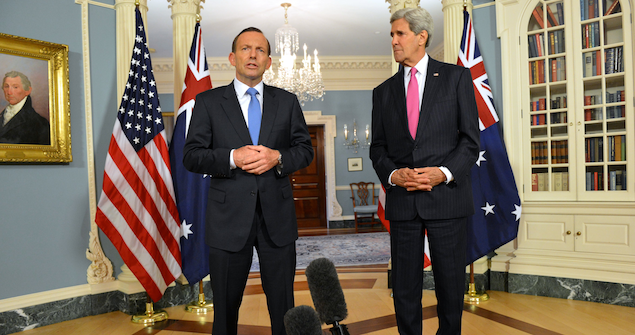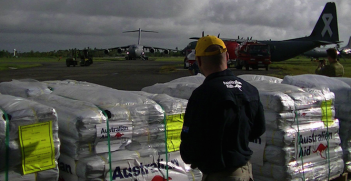Australia and the US - Too Close for Comfort?

In this article, AIIA National President John McCarthy argues that Australia should reconsider its disproportionately strong security ties with the United States.
In a conversation in October last year with two British foreign correspondents and a former Japanese Prime Ministerial foreign policy adviser, the subject turned to the United States. All three interlocutors argued that in recent years Australia had superseded both Japan and the United Kingdom as the United States’ closest ally.
This view should not have come as a surprise.
The dominance of the alliance
Like the British, we had just become involved in the third Iraq war and were still in Afghanistan. For the British the latter had been their longest war since Napoleon. For the Americans and ourselves, it had been our longest war ever.
In one sense Japan, host since the end of the Pacific War to United States bases in Honshu and Okinawa, had to be America’s closest ally. However, Japanese constitutional requirements, even as reinterpreted by Prime Minister Abe in 2014, preclude Japan from playing as unencumbered a military role as NATO countries or Australia in support of United States’ policies.
Unlike the British, we had entered the 2003 and 2014 Iraq wars without even parliamentary debate. Our contingent for the 2014 Iraq war is now bigger than that of the British.
In late 2013, our prime minister had suggested through the tone of his defence of our right to eavesdrop on the then Indonesian president and his wife, that the framework of intelligence gathering we shared with our Anglosphere friends and allies was more important than our relationship with our neighbours.
And in October last year, reports had leaked that the Australian prime minister and foreign minister had successfully halted a proposal by our treasurer and trade minister to become founding members of the Chinese sponsored Asian Infrastructure Investment Bank because of objections from the United States – a position we now seem likely to alter only after the British Conservative Government decided to join.
Twenty years earlier, the distinguishing feature of the Australian foreign policy framework was the imperative of engagement with Asia. The distinguishing feature of our foreign policy framework today is the paramountcy of our alignment with United States. We have become an American satrap.
In Australia, respect for the United States justifiably runs deep. Our alliance with the United States is in our interest. The status of a satrap is not.
This contention raises three issues.
The shift in security policy
The first is that we have directed the sharp end of our security resources outside our region and, incidentally, outside the region covered by ANZUS. This is a major change for any power, but particularly a middle power. This has been a fundamental shift from our security and foreign policy foci from the end of WW2 until 9/11.
While a number of reasons have been cited for our involvement in the Gulf war, Afghanistan and now twice in Iraq, the main one is that the United States has been involved in these hostilities – NOT that Australian security has been directly threatened, at least in such a way that our military involvement would act as a serious counterforce or as a deterrent to any actual potential threats to us emerging from developments in those areas.
During the Cold War era, our major military involvements – Korea and Vietnam – were in Asia. While to this day, the merits of our involvement in Vietnam are debatable, we were engaged in our own region where in the view of the government of the day, we had a direct security interest in the defeat of North Vietnam.
The one military venture in which Australia has taken the lead was in East Timor in 1999 – also in our own region.
We did not and do not have to be in the Middle East – certainly to the extent that we have so become. The ANZUS alliance does not mean we have to be involved militarily alongside the United States wherever it wants us. Canada and Britain –close American allies – did not provide troops to Vietnam. In fact the ANZUS alliance only embraces threats in the Pacific, including the metropolitan territories of the parties.
9/11 was an attack on the United States. Hence ANZUS was the premise upon which we justified our dispatch of troops to Afghanistan. The ANZUS treaty could not justify our involvement in Iraq either in 2003 or in 2014.
To cite historian Peter Edwards, Australia’s security focus has shifted from defence of Australia to defence of Australia’s interests and values – although the question of where our main interests lie is moot.
The alliance and the region
The second issue is the degree to which our alignment with the United States – as it applies both within and outside the region – is a positive or negative factor for our interests within the Asia Pacific region.
The answer is positive provided we retain independence of thought and action, but problematic if we do not.
The United States will remain involved in the region primarily because its interests so dictate and its resources so permit – not because it is allied to Australia. But if we indeed want the United States to remain an effective force –as we do – it is inconsistent not to abide by our alliance obligations
For most countries, particularly Japan, but also India, and to differing degrees most of ASEAN, Australia’s security link with the United States is seen in a positive light. An American ally in the South West Pacific suits the strategic objectives of most of the region.
China places value on its relations with Australia primarily because of our resources relationship. It understands the nature of the ANZUS alliance although it might not much like it. It views a strengthening of the triangular relationship involving the United States, Japan and Australia with concern – as it does some Australian statements, for example on the disputed territories in the South China Sea and the East China Sea.
We make no argument here for burying our head in the sand when faced with aggressive Chinese actions – provided our reactions are considered and measured against the yardstick of our own interests.
The danger posed by an alliance in which no light is perceived between United States and Australian policies is twofold.
Australian security interests are not ipso facto the same as those of the United States. This could be relevant where our armed forces are integrated into American force structures.
For example if an Australian vessel were integrated into a battle group in the United States Seventh Fleet based in Japan, what would we do if that group were ordered into an action which could involve hostilities with China?
While protocols exist to extract a vessel in these circumstances, the question would arise how we could handle the matter in political terms. As a former chief of the army said recently about our dilemma, were the Americans to look to us to take action where we did not think that to do so would be consistent with our interests, “I hope we would have the courage to say no”.
A second danger is that the current strict contiguity of our views with those of the United States on security both within and outside the region gives support to the perception that we do not think for ourselves or, when we do, that we do not have the courage to take positions different to those of the United States.
This perception is harmful. The region shares concerns about the rise of China, but there are different views on how to deal with it. Everyone wants a say in the evolution of the new Asia. If we want to be listened to, we must have views of our own – and be prepared to propagate them even if they are different to those of the United States. The matter of the Asian Infrastructure Investment Bank is a case in point.
Doing the region justice
The third major issue is this. Even if it is accepted that since 9/11, our relationship with the United States has moved from being one of Ally to one of Super Ally, have we been able nonetheless to do our region justice? Have we been able to walk and chew gum at the same time?
In one sense, we have. Our global diplomatic presence is overwhelmingly weighted to the Asia Pacific. Our foreign policy apparatus is talented and thorough – albeit that it receives scant acknowledgment. We also have a political system which demands of its participants a steady stream of visible achievements amenable to boastfulness. This can lead to foolish pandering to the media and can be counterproductive. But sheer effort can also lead to results.
Late in the last century, Australia initiated, or significantly contributed to, Asia/Pacific regional structures – in particular APEC and the ASEAN Regional Forum (ARF). In recent years Australia was in part responsible for the expansion of the East Asia Summit (EAS). Australia has also negotiated FTAs with a number of Asian countries including Japan, China and South Korea and is negotiating one with India.
On security, transnational and development issues, Australia has since the 1960s – including in recent years – negotiated a network of bilateral agreements and cooperative arrangements with Asian countries which seldom receive public attention but are solidly in our national interest.
In other senses, we have failed or at best had marginal success.
As an essentially Western democratic country whose neighbours have political systems and cultures different from our own, it is incumbent upon us to place an emphasis on educating our society to manage the challenges of living with and working in Asia – particularly as the latter becomes globally more significant. It is often argued that we made a better fist of managing these challenges in the 70s than today.
In the 2013 White Paper, “The Asian Century”, emphasis was placed on preparing our society and economy better to take advantage of the opportunities in Asia. The then government was not prepared to find funds to pay for what the White Paper prescribed and the current government, having damned it with faint praise in opposition, wiped it from the DFAT website when it came to power.
It is into these areas of better preparing Australia and Australians to deal with our neighbours that we should place more of our political energy and economic resources. Because of the absence of a widespread and vocal constituency in favour of such objectives and because of the problem of identifying short-term results, the right policies require political courage of an order which has been in short supply in recent years.
We have also failed to implement consistently solid public diplomacy programs through the range of tools available – missing opportunities to shape perceptions in the region of what Australia and its policies are about.
Conclusion
The foregoing is not an attempt to prescribe how Australia should develop its foreign policy in future years. Nor does it seek to answer the big questions about how power will be dispensed in the region, nor how to the major transnational issues of the era should be managed, nor to canvas the differences between the Cold War and post 9/11 paradigms.
But if this note conveys a sense of urgency about again directing most of our foreign policy energy into the region, not beyond it, bearing in mind that our security relationship with the United States should be part of – and consistent with – that objective rather than dominating it, it will have served its purpose.
A final comment is that in policy formulation, there is always one question to be posed. Are we acting in the national interest? If that question is answered honestly, free from febrile intellectualism on the one hand or populist cant on the other, we have a prospect of getting things right for future generations.
John McCarthy is National President of the Australian Institute of International Affairs and former Australian ambassador to Indonesia. This article was originally published in Pearls and Irritations on 12 May 2015 and it is part of a series including AIIA Fellows Stephen FitzGerald, Stuart Harris and others. It is republished with permission.





